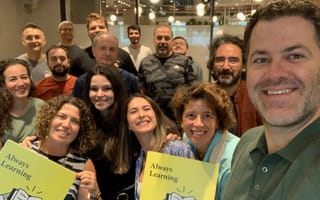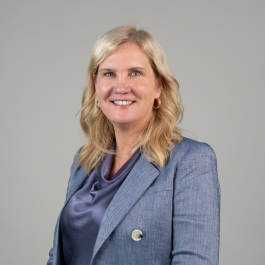According to a 2023 study by the World Economic Forum, nearly half the global workforce might need reskilling by 2025.
Skill development is what Udemy does. Its Intelligent Skills Platform and global community of instructors have helped millions of learners and thousands of organizations.
Now, Udemy is putting skills at the center internally, as well, by becoming a skills-based organization. This move is not just a strategy but an organizational evolution, prioritizing and integrating key skills into Udemy’s core offerings and learning experiences.
“Our mission is to transform lives through learning, and building a skills-based organization is central to that mission,” said Chief People Officer Karen Fascenda.
The transition focuses on skills as the foundation of the company’s talent processes, from hiring to development. Boosting career development and enhancing internal mobility at Udemy empowers its employees to thrive without relying solely on traditional markers like degrees or seniority.
“I have a vision of a skills subway map,” Fascenda explained. “Someone in finance could look and understand, ‘These are the skills I need to grow in finance, but if I wanted to move over to the learning team, these would be the skills that I can develop.’ We would have all of our curriculum mapped to those skills, so people can grow up in the organization and have career changes.”
“I have a vision of a skills subway map. We would have all of our curriculum mapped to those skills, so people can grow up in the organization and have career changes.”
According to Fascenda, this skills-focused model has even more far-reaching effects, including setting a model for the organizations it partners with globally.
“Skills are the key to unlocking potential and remaining competitive in today’s economy,” said Fascenda. “By focusing on becoming a skills-based organization, we have the potential to produce meaningful business outcomes and increase productivity, agility and business continuity while filling skills gaps.”
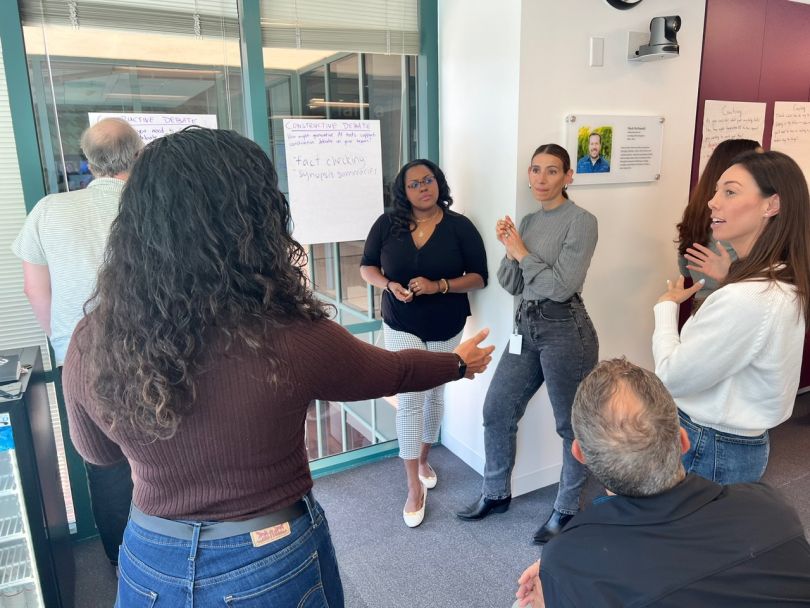
A Skills-First Blueprint
While Udemy’s emphasis on skills isn’t new, the shift to a formalized skills-based organization is making these principles more precise and measurable.
“Becoming a skills-based organization is not an all-or-nothing approach — it’s a series of steps along a continuum toward seeing skills for the basis of talent processes,” said Chief Learning Officer Melissa Daimler. “We are not replacing approaches but complementing and evolving them, integrating a more precise way of hiring, developing and moving employees around an organization based on their observable skills.”
“Becoming a skills-based organization is not an all-or-nothing approach — it’s a series of steps along a continuum toward seeing skills for the basis of talent processes.”
For Udemy’s hiring team, this transition starts with job postings.
“We’ve developed a skill-based template for job descriptions and interview guides,” said Head of Global Recruiting Alessandra Pegnim. “By collaborating with hiring managers, we identify the most important skills for a role and ensure we’re screening and interviewing candidates based on those skills.”
This approach has also shifted how Udemy evaluates resumes. Instead of relying solely on years of experience or traditional credentials, the focus is on the skills a candidate brings to the table.
“When we remove the degree requirement from job descriptions, it opens the door for more candidates to apply,” Pegnim said. “We’ve already seen an increase in the diversity of candidates applying because of this change.”
Udemy’s commitment to democratizing learning and making it accessible has shaped its internal practices as well. Each month, Udemy holds “UDays,” which are dedicated days where employees can focus on developing the skills most important to them. Recently, team members in Dublin used their UDay to sharpen their consulting skills and deepen their expertise in generative AI.
“‘Always learning’ is a core value at Udemy, and based on that value, we have identified a skill of engaging in constructive debate with one another that allows us to learn more effectively,” Fascenda noted. “Our employees are encouraged to use their UDays to build skills and model our ‘always learning’ value.”
Fascenda emphasized that these initiatives aren’t about changing the company’s culture but amplifying it.
“We are weaving skills into the employee experience at every level,” she said. “From performance management to open roles and internal projects, we see opportunities to foster growth and mobility by recognizing and developing skills.”
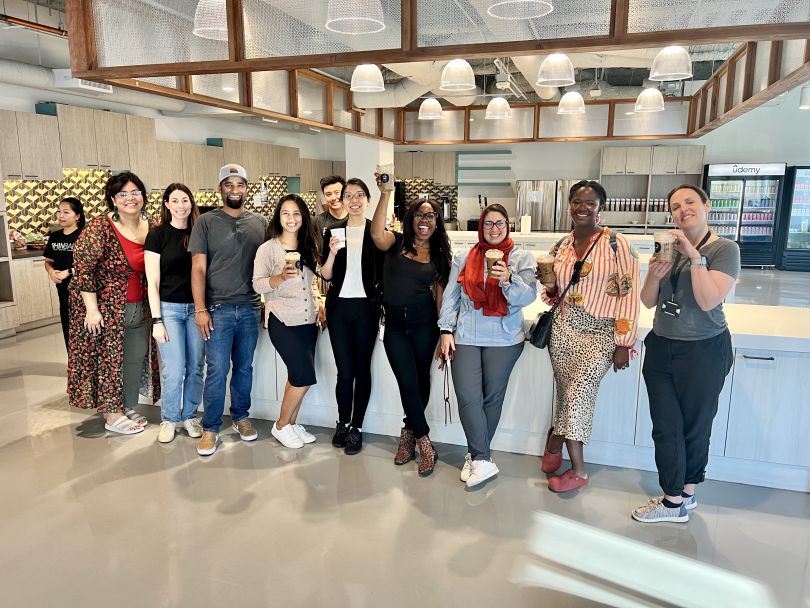
Connecting Skills to Business Outcomes
One of the critical aspects of a skills-based organization is aligning skills to business needs. Udemy’s leaders are actively encouraged to think beyond job titles and assess the skills their teams need to succeed.
“It’s about being more precise and intentional in understanding how a skill, like decision-making, impacts different roles across the company. This approach allows us to measure outcomes more effectively,” Daimler explained.
Udemy has also refined its succession planning processes, ensuring that employees have individualized learning paths tailored to their current and future roles. According to Fascenda, this is vital for creating readiness in a rapidly evolving business landscape.
“Our leaders play a key role in transforming to a skills-based organization,” she said. “We want to ensure they know how to identify, assess and develop their teams’ skills.”
The impact of Udemy’s skills-based approach can be seen in tangible examples of internal mobility.
Fascenda shared a story about a recruiter with a finance background who transitioned to a compensation analyst role.
“He leveraged his understanding of sales hiring and used Udemy’s learning platform to bridge the gaps in his knowledge,” she said. “He’s now a key contributor on our compensation team, which is great for his growth and us as an organization.”
“[One of our recruiters] leveraged his understanding of sales hiring and used Udemy’s learning platform to bridge the gaps in his knowledge. He’s now a key contributor on our compensation team.”
Pegnim added that the shift to thinking about skills is essential for hiring managers.
“We ask them to consider who internally might have the skills needed for a role and how we can help them develop the additional skills they need,” she explained. This mindset helps managers look beyond traditional metrics and embrace a more flexible, skill-focused approach to hiring and development.
Ultimately, Udemy employees will be able to holistically understand the full lattice of skills that would allow them to excel in their current role — or thrive somewhere else within the organization.
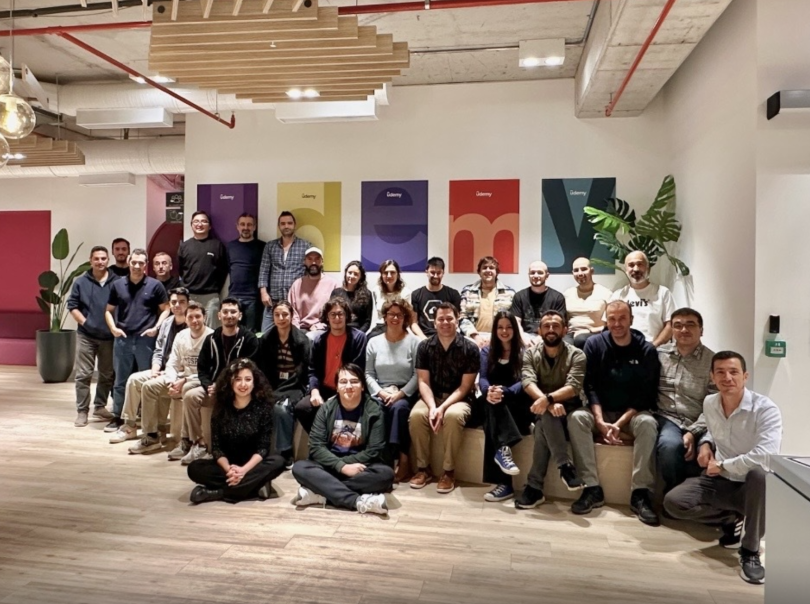
A Continuous Journey
As Udemy continues to evolve, it remains committed to its values and mission, and becoming a skills-based organization is more than a strategy — it’s a way to future-proof the business, empower its employees and deliver on its mission of transforming lives through learning.
“We want to be courageously experimental and always learning, consistent with our values and behaviors,” Daimler said. “By embedding a skills-based approach into our core processes, we are positioning ourselves to innovate and stay ahead in a rapidly changing world.”
“We want to be courageously experimental and always learning, consistent with our values and behaviors.”
According to Pegnim, Udemy is uniquely positioned to create expansive opportunities for its team to build skills and share that vision and approach with organizations and partners around the world.
“The skills gap in the future needs a solution, and Udemy is that solution.”

